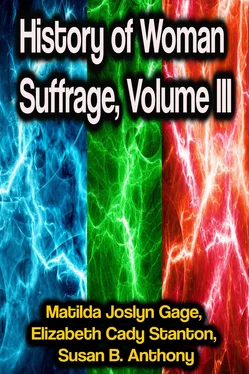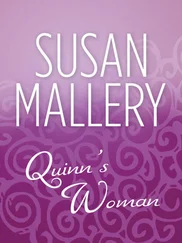On Monday, March 13, 1882, the Chair announced the appointment of the following gentlemen as the Select Committee on Woman Suffrage authorized by the House: Mr. Camp of New York, Mr. White of Kentucky, Mr. Sherwin of Illinois, Mr. Stone of Massachusetts, Mr. Hepburn of Iowa, Mr. Springer of Illinois, Mr. Vance of North Carolina, Mr. Muldrow of Mississippi and Mr. Stockslager of Indiana.
The Annual Washington Convention was held in Lincoln Hall as usual, January 18, 19, 20, 1882. The afternoon before the convention, at an executive session held at the Riggs House, forty delegates were present from fourteen different States.[84] Among these were five from Massachusetts, and for the first time that State was represented on the platform of the National Association. Mrs. Stanton gave the opening address, and made some amusing criticisms on a recent debate on Senator Hoar's proposition for a special committee on the rights and disabilities of women. Such a committee had been under debate for several years and it was during this convention that the bill passed the Senate.
Invitations to attend the convention were sent to all the members of congress, and many were present during the various sessions. Miss Ellen H. Sheldon, secretary, read the minutes of the last convention, and, instead of the usual dry skeleton of facts, she gave a glowing description of that eventful occasion. Clara B. Colby gave an interesting narration of the progress of woman suffrage in Nebraska, and of the efforts being made to carry the proposition pending before the people, to strike the word "male" from the constitution in the coming November election.
Rev. Frederick A. Hinckley of Providence, R. I., spoke upon "Our Demand in the Light of Evolution." He said:
It is about a century since our forefathers declared that "governments derive their just powers from the consent of the governed," and about a half century since woman began to see that she ought to be included in this declaration. At present the expressions of the Declaration of Independence are a "glittering generality," for only one-half of the people "consent." Modern science has demonstrated the truth of evolution—like causes produce like results—and this is seen in the progress of government and of woman. From the time when physical force ruled, up to the present, when ostensibly in the United States every person is his own ruler, there have been many steps. The importance of the masses has steadily taken the place of the importance of individuals. At first the idea was "You shall obey because I say so"; then, "You shall obey because I am your superior, and will protect you"; now it is "Everyone shall be his own protector." But we do not live up to this idea while only one-half instead of the whole of "everyone" is his own protector. The phases of woman's advancement are fitly described by the four words—slave, subject, inferior, dependent; and no step in this advance has been accomplished without a hard struggle. The logic of evolution in government points to universal suffrage. The same logic points to unqualified individual freedom for woman.
Mrs. Blake in reporting from her State said:
Governor Cornell was the first New York Governor to mention woman in an inaugural address, and the bill allowing women to vote in school elections was passed the same winter. There was a great deal of opposition in different parts of the State to the voting of women. In some country districts where the polls are in the school-houses, certain men went early and locked the doors, filled the room with smoke and even put tobacco on the stoves to make it as disagreeable for the women as possible. More respectable men had to ventilate and clean the rooms to make them decent for either man or woman. From this lowest class of opponents up to those who say: "My dear, you'd better not make yourself conspicuous!" the spirit is the same. Believing that under our constitution women are already entitled to the ballot, we do not ask for a constitutional amendment, but for a bill extending the suffrage at once.
Mrs. Colby in contrast to this stated that in Nebraska the greatest courtesy had always been shown to women who voted at school elections. There is only one organized effort against woman suffrage, and that is made by the "Sons of Liberty!" "O, Consistency, thou art a jewel!"
The following resolution introduced into the Senate, January 11, by Mr. Morgan of Alabama, was finally referred to the Committee on Woman Suffrage. This was the first subject brought before them for action.
Resolved , That the committee on "The extension of suffrage to women, or the removal of their disabilities," be directed to examine into the state of the law regulating the right of suffrage in the territory of Utah, and report a bill to set aside and annul any law or laws enacted by the legislature of said territory conferring upon women the right of suffrage.
Miss Couzins made an admirable speech on the following resolution:
Resolved , That Senator Morgan's bill to deprive the women of Utah of the right of suffrage because of the social institutions and religious faith originated and maintained by the men of the territory, is a travesty on common justice. While the wife has not absolute possession of even one husband, and the husband has many wives, surely the men and not the women, if either, should be deprived of the suffrage.
Miss Couzins said: The task of dealing fairly and justly with this territorial complication should never be committed to the blundering legislation of man alone. His success as a legislator and executive for woman in the past does not inspire a confidence that in this most serious problem he will be any the less an unbiased judge and law-giver. This government of men permitted the establishment of a religious colony, so called, whose basis of faith was the complete humiliation of women; recognized the system by appointing its chief, Brigham Young, governor of the territory, under whose fostering care polygamy grew to its present proportions.
That woman has not thrown off the yoke of religious despotism can be readily appreciated when we recognize the fact that man, from time immemorial, has played upon her religious faith to exalt his own attributes and degrade hers; that through this teaching her abiding belief in his superior capacity to interpret scriptural truths for her has been the means of sacrificing her power of mind, her tender affections, her delicate sensibilities, on the altar of his base selfishness throughout the ages. Orthodoxy recognizes no "inspiration" for woman to-day. She is not "called" save to serve man. Under its teaching her thought has been padlocked in the name of Divinity, and her lips sealed in sacrilegious pretense of authority from heaven; and nothing so clearly bespeaks the degenerating influence of the ages of this masculine teaching as the absolute faith manifested by the women of Utah in this ipse dixit of man's religious doctrine. Their emancipation must necessarily be slow.
The paternal government allowed polygamy to be planted, take root, and grow in a wilderness where the attraction of nobler minds and freer thoughts was not known. The victims came from the political despotisms of the old world to be shackled in a land of freedom with a still darker despotism, and under the ægis of the American flag they have borne children as a religious duty they owed to God and man; and surely it can not be expected, even with that grand emancipator, from king and priestcraft rule, the ballot, that at once they will vote themselves outcast and their children illegitimate.
It took the white men of this nation one hundred years to put away that relic of barbarism, slavery; the removal of the twin relic will come through liberty for woman, higher education for children, and the incoming tide of Gentile immigration. The fitting act of justice is not disfranchisement of woman, as Senator Morgan proposes, and the reënactment of that old Adamic cry: "The woman whom thou gavest," but the disfranchisement of man, who is the only polygamist, and the stepping down and out of the sex as a legislator under whose fostering care this evil has grown. Retire to your sylvan groves and academic shades, gentlemen, as Mrs. Stanton suggests, and let the Deborahs, the Huldahs, and the Vashtis come to the front, and let us see what we can do toward the remedy of your wretched legislation. But suffrage for women in Utah has accomplished great good. I spent one week there in close observation. Outside of their religious convictions, the women are emphatic in condemnation of wrong. Their votes banished the liquor saloon. I saw no drunkenness anywhere; the poison of tobacco smoke is not allowed to vitiate the air of heaven, either on the streets or in public assemblies. Their court-room was a model of neatness and good order. Plants were in the windows and handsome carpets graced the floor. During my stay, the daughter of a Mormon, the then advocate-general of the territory, was admitted to the bar by Chief-Justice McKean of the United States Court, who, in fitting and beautiful language, welcomed her to the profession as a woman whose knowledge of the law fitted her to be the peer of any man in his court. She told me that she detested polygamy, but felt that she could render greater service to the emancipation of her sex inside of Utah than out. At midnight I wandered, with one of my own sex, about the streets to test the assertion that it was as safe for women then as at mid-day. No bacchanalian shout rent the air; no man was seen reeling in maudlin imbecility to his home. No guardians put in an appearance, save the stars above our heads; no sound awoke the stillness but the purling of the mountain brooks which washed the streets in cleanliness and beauty. What other city on this continent can present such a showing? With murder for man and rapine for woman where man alone is maker and guardian of the laws, it behooves him to pause ere he launches invectives at the one result of woman's votes.
Читать дальше












